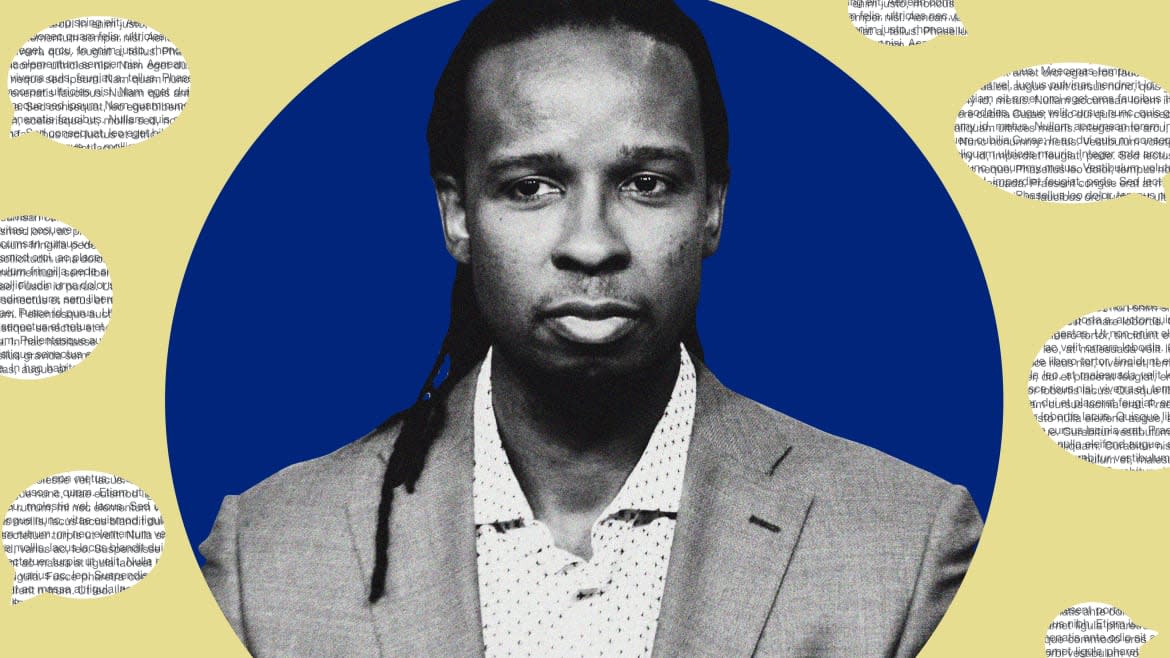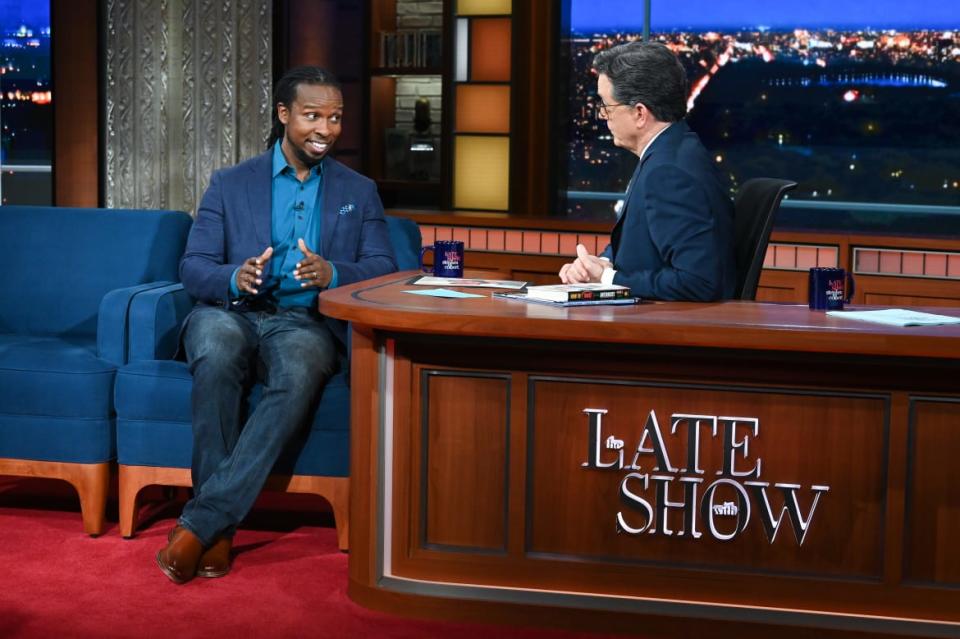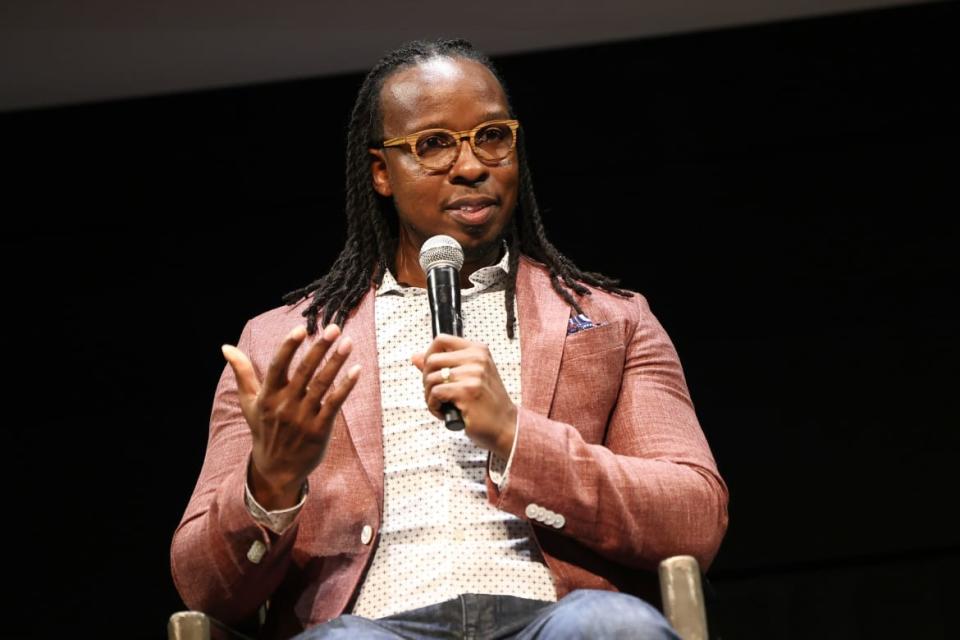Ibram X. Kendi’s Refusal to Debate Critics Was an Act of Surrender

- Oops!Something went wrong.Please try again later.
Dr. Ibram X. Kendi is inarguably one of the most influential public intellectuals in the world—and one of its foremost authorities on antiracism. He literally wrote the book, How to Be an Antiracist—a bestseller many times over, now a near-ubiquitous presence in college (and many high schools’) curricula, and the lodestar to corporate and government DEI training.
He was the youngest National Book Award winner for nonfiction in 2016 for his book, Stamped from the Beginning: The Definitive History of Racist Ideas in America. He was bestowed a MacArthur “Genius” Grant in 2021. And the success of How to Be an Antiracist spawned an entire cottage industry of spinoff books, including children’s tomes like Antiracist Baby and Goodnight, Racism. One of his books has even been adapted into a soon-to-be-released film for Netflix, and he just launched a series on ESPN+.
In the wake of the 2020 social justice uprisings following the police murder of George Floyd, Kendi established the Center for Antiracist Research at Boston University, buttressed by a $10 million grant from Twitter founder Jack Dorsey. The center would reportedly raise more than $43 million in donations, and for a time, it had a partnership with the venerable Boston Globe to produce The Emancipator, described as “a new media platform that will reframe the national conversation on race.”
What I Saw While Working at Ibram Kendi’s Center for Antiracist Research at Boston University
Put simply, he’s a superstar in the public intellectual milieu, and his philosophy of antiracism defines the modern social justice movement.
Mainstream institutions accepted his word as gospel. Lawmakers cited him when introducing legislation. Corporations changed their business practices based on his teachings.
But Kendi distinguished himself from many of the great civil rights leaders and radical activists of the past by steadfastly refusing to debate critics, or even engage with criticism. No matter how distinguished the inquisitor, how reasonable the question, or how seemingly obvious it should be that the best ideas ought to be battle-tested in public, rather than decreed from enlightened elites—with extraordinarily rare exceptions, Kendi wouldn't even sit for an interview where a single skeptical question would be asked.
Don’t take my word for it, Kendi himself essentially said this very thing in a July 2021 essay for The Atlantic: “…I have seldom stopped to answer the critiques of critical race theory or of my own work, because the more I’ve studied these critiques, the more I’ve concluded that these critics aren’t arguing against me. They aren’t arguing against anti-racist thinkers. They aren’t arguing against critical race theorists. These critics are arguing against themselves.”
In September 2023 it was reported that the Center for Antiracist Research was laying off more than half of its employees, having not produced any substantial scholarship, books, or research projects despite its extraordinary endowment. Several former members of the staff wrote critically of the center’s management (including this piece for The Daily Beast), and Boston University is conducting an “inquiry” into how it all went wrong.
Kendi defended his management of the center, and said he was “devastated” both by having to conduct layoffs and by “disgruntled people who are sort of using the moment to express problems. And allegations that are baseless, unfounded.”

Dr. Ibram X. Kendi with Stephen Colbert on CBS’ The Late Show.
Whatever the results of the investigation, one thing is clear, it is no longer socially verboten to question Dr. Ibram X. Kendi.
And that's a good thing. Radical ideas—good and bad—should be debated and exposed to sunlight, not only to prove the wrongness of bad ideas, but to make the best arguments stronger and to give them a chance to win over the public by proving that they can survive scrutiny. At their best—they can move hearts, change minds, and inspire social progress.
THE SAINT OF 2020
Though he’d been active as a public intellectual and author for almost a decade, it was in 2020 when Kendi went from “noted academic” to “civil rights hero” in the cultural zeitgeist—and hero is not an exaggeration.
It’s important to recall the context of the social justice revolutions of 2020.
There was a constant state of high anxiety, as the COVID pandemic was only months old, Americans were dying by thousands, schools were closed, livelihoods were lost, and some people were so deranged by culture war paranoia that they refused to believe the coronavirus was a real problem at all.
We were living under a president—racist, incompetent, corrupt, and unstable even in “normal” times—who willfully misled the public about the dangers of COVID because he thought it would help his approval numbers.
And then Minneapolis police officer Derek Chauvin murdered George Floyd, an unarmed man, in broad daylight, on video that would be seen worldwide.
Why the 2020 Social Justice Revolutions Failed
The powder keg had the spark it needed. And as massive demonstrations broke out all over the world, Kendi’s ideas became widely accepted in mainstream institutions as “the answer,” and he was revered by media, academia, and other spheres of influence as a near-prophet.
But even if you read and listened with the most open of minds, what he was saying typically resembled the definition of Manichean—squashed of nuance, a rigid binary that declared people and ideas to be simply racist or antiracist. (And to disagree with the premise of this choice was to be racist, under Kendi’s rules.)
Like George W. Bush’s post-9/11 edict, “You’re either with us or the terrorists,” Kendi’s philosophy left no room for debate. To dissent was to confess to being a bad person, and to express incomprehension only meant you hadn’t “done the work,” which, naturally, meant reading Kendi’s books and agreeing with every word.
There was only right and wrong—and he was right. And, no, he would not explain any further, nor would he defend his position against specific criticism—even when challenged by other prominent Black intellectuals. He was right, his was the path to justice, the end.
WAITING FOR KENDI
I tried—and failed—to get schooled by Dr. Ibram X. Kendi.
In September 2020, Kendi caused a stir by tweeting in response to a conservative’s (since-deleted) tweet that argued then-Supreme Court nominee Amy Coney Barrett couldn’t be racist because she adopted two dark-skinned children from Haiti.
Kendi wrote: “Some White colonizers ‘adopted’ Black children. They ‘civilized’ these ‘savage’ children in the ‘superior’ ways of White people, while using them as props in their lifelong pictures of denial, while cutting the biological parents of these children out of the picture of humanity.”
We Need an Honest Conversation About Teaching Social Justice in Public Schools
On a historical level, this is absolutely true. And parents of Black adopted children are fully capable of holding racist thoughts and saying racist things. However, Kendi’s definition of “racist” is far more encompassing. Per his antiracist philosophy, almost all of us are “racists.” (In a withering 2019 review of How to Be an Antiracist, The New Yorker’s Kelefa Sanneh recalled how Kendi had at various points characterized Barack Obama and W.E.B. Du Bois as racist, for being insufficiently antiracist.)
Even before Elon Musk rebranded the site as X and made it a safe space for overt racists who paid $8, Twitter was a cesspool of trolls, mob pile-ons, and mean-spirited bile. So it was perhaps naive that I thought I could expect a substantive conversation when I jumped into Kendi’s mentions to ask: “Genuine question for Dr. Kendi: If you’re an adoptive parent and you don’t care whether the child is of your ‘race,’ is that ‘racism’ or ‘antiracism’?”
To my surprise, Dr. Kendi promptly replied: “Good question. It could be either. I’d need more information on what ‘not caring’ actually means. Is not caring being ‘colorblind’? Is not caring not devaluing darker children who are the least likely to be adopted? This is not a convo for Twitter.”
Kendi is 100 percent correct that Twitter is the last place a topic requiring considerable nuance and latitude should be conducted. However, this highly provocative conversation was started on Twitter by the preeminent antiracism scholar of our time. And yet in short order, Dr. Kendi deemed it “not a convo for Twitter.”
Responding to my emailed request to continue the conversation off Twitter, Kendi’s assistant told me his “schedule is at capacity at the moment so he’s unable to connect.” (I made many more attempts over several weeks to speak with other experts at the Center for Antiracist Research, but was ultimately told by a communications rep that Kendi and everyone at the center was essentially too busy to talk to me until the end of time.)

Dr. Ibram X. Kendi speaks at the Toronto International Film Festival. Sept. 9, 2023.
I was a full-time opinion columnist at another publication at the time, and this seemed like an obvious opportunity for commentary on a direct exchange with the thought leader representing the biggest social upheaval in a generation.
Without taking any position on his philosophy, I wrote a 3,000-word essay about how this massively influential public figure would not debate critics, address criticism, or even clarify some of his more confusing absolutist statements.
I spoke with some of his supporters, I spoke with some of his critics—and cited more examples of both. And I ultimately concluded: “Kendi’s ideas may very well be proven correct and ahead of their time. But to protect them from rigorous inquiry is to miss the opportunity to address any contradictions, offer clarifications, and persuade skeptics.
“Antiracism, and all it now encompasses, is changing education, workplaces, and basic human interaction. It is too important a subject to not be afforded a wide berth of debate and discussion. Revolutionary ideas cannot be deemed too important to explore in granular detail.
“People want to be ‘antiracist.’ But it’s pretty hard to do the right thing if they’re told the wrong thing is essentially, everything.
“When words are sacrosanct, they’re no longer ideas, they’re gospel.”
The piece was bumped back by my editors for months, before ultimately being spiked entirely without explanation. But I didn't want to push the issue any more than they wanted to confront it. I knew the explanation.
The unfortunate reality of that brief, overwrought era of unthinkables was—unless you were ensconced in the right-wing or the most obscure corners of the socialist left—polite society’s unwritten rule in 2020 was Thou Shalt Not Speak Ill of Kendi.
Why Clown Pundits Are Defending a Racist to Own the Libs
It didn't feel right then, and it seems plainly absurd now.
Martin Luther King, Jr. wasn’t a shrinking violet. Neither was Malcolm X or Frederick Douglass. They found the time to debate critics and argue ideas in public. Their ideas did battle with the forces of racism and regression in plain sight. That’s how they won hearts and minds and fostered progress.
James Baldwin was a seminal author of both fiction and nonfiction, and was also one of the preeminent racial justice activists of the 20th century. Baldwin participated in a televised debate with William F. Buckley—an opponent of the Civil Rights Act, the founder of National Review, and arguably the preeminent conservative intellectual voice of his generation. And the world is better for the fact that Baldwin advocated for justice and put his own ideas on the line against an formidable opponent, rather than retreating to exclusively sympathetic platforms.
For a time Kendi’s aura was shielded by a culture of ideological compliance and fear of rocking the boat (no one wants to be accused of being a bad faith whataboutist for “just asking questions”—even when it’s completely appropriate and necessary for certain questions to be asked!). But it seems the fever of 2020 has broken, however subtly.
The Right Needs to Ask: ‘Why Do These Racists Keep Getting Hired by Us?’
Just as I did in 2020, when my column arguing for the virtues of public debate, free inquiry, and dissent was buried out of fear, I don’t intend to make it my place to pass judgment on Kendi’s philosophy or scrutinize his rise to stardom. There are plenty of other worthy voices in academia and activism on that job already.
But three years later, a deep breath and some added perspective ought to allow us to recognize that it’s always the time for debate and dissent—whether it's during the upheaval of 2020 or the security panic after the September 11 terror attacks. Mainstream institutions should have never accepted Kendi’s ideas as sacrosanct, nor should they have anointed him as a perfectly unimpeachable messenger on one of the most crucial issues of our time.
This isn’t to say that every bad faith actor or question deserves the same consideration, some simply aren't worth engaging. But surely it’s an act of surrender, not strength, for an intellectual giant whose ultimate goal is nothing short of a revolution to declare all critics or criticism as inherently malevolent and not worth his energies.
Honest critics and skeptical interlocutors should not be summarily dismissed as tools of the oppressor. Movements demanding revolutionary social change cannot succeed by simply declaring the debate to be “over.”
Radical ideas must be put through the gauntlet. That gives them the strength and authority to inspire radical change. Anything less is a disservice to the cause, and blind devotion to gospel.
Get the Daily Beast's biggest scoops and scandals delivered right to your inbox. Sign up now.
Stay informed and gain unlimited access to the Daily Beast's unmatched reporting. Subscribe now.

